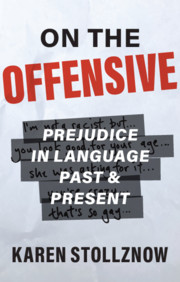5 - That’s Crazy
Published online by Cambridge University Press: 06 October 2020
Summary
This chapter examines ableism: discriminatory language related to health, disease, mental illness, and intellectual and physical disability. We analyze stigmatization in speech, and look at metaphors and culturally insensitive words and phrases related to chronic sickness, psychiatric treatment, and disability (e.g., retard, spastic, stupid, handicapped, and lame.) We consider why some conditions are tabooed (e.g., cancer), why others are romanticized (e.g., consumption), and why the euphemism treadmill (when words become offensive and are replaced with new words that ultimately become offensive too) is a common phenomenon in this area of language. We look at words that are inclusive and preferred by relevant groups and communities, such as people with mental illnesses, Blind people, within Deaf culture, etc. We also discuss the debate regarding the use of person-first language versus identity-first language.
Keywords
- Type
- Chapter
- Information
- On the OffensivePrejudice in Language Past and Present, pp. 159 - 195Publisher: Cambridge University PressPrint publication year: 2020

